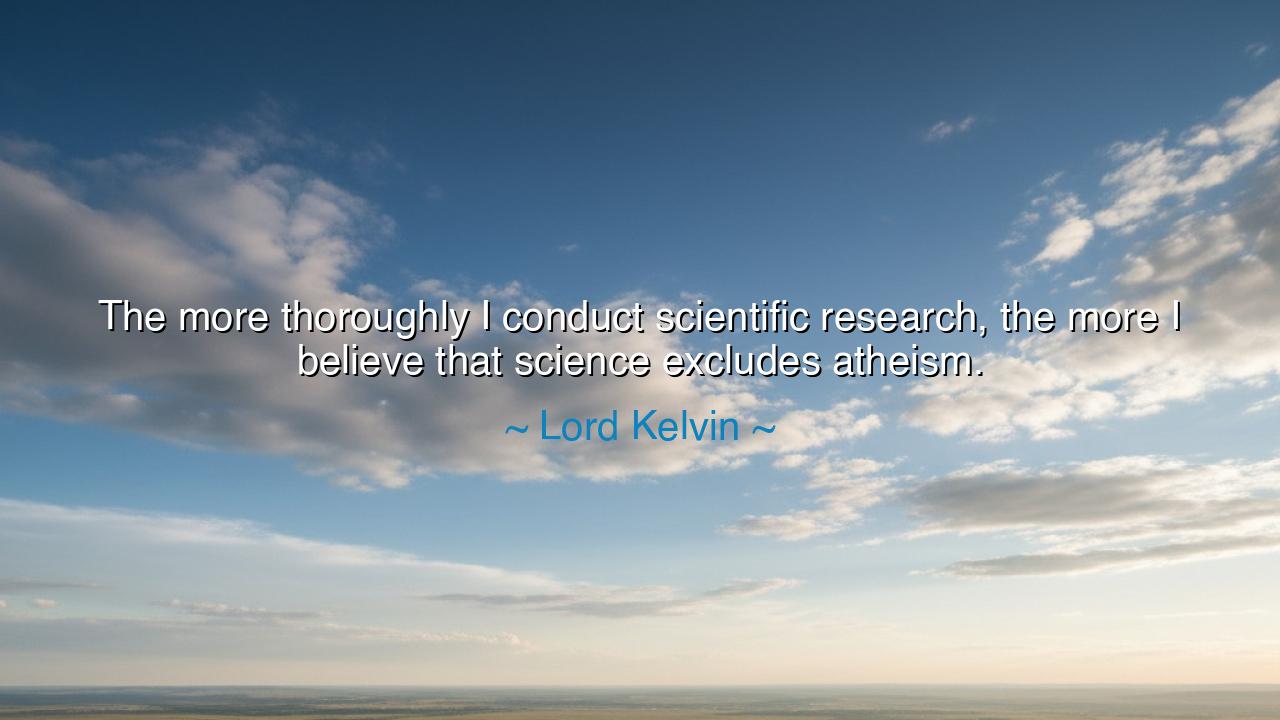
The more thoroughly I conduct scientific research, the more I
The more thoroughly I conduct scientific research, the more I believe that science excludes atheism.






Listen, O children of wisdom, for the words of Lord Kelvin carry with them the weight of deep reflection on the nature of science and faith. "The more thoroughly I conduct scientific research, the more I believe that science excludes atheism." In this declaration, Kelvin speaks of a profound truth—that in the very pursuit of scientific knowledge, the evidence of the divine becomes more evident. The deeper we delve into the mysteries of the natural world, the more we come to see that the laws governing the cosmos, the intricate design of life, and the vastness of the universe all point toward the existence of a Creator, one whose work is revealed in the perfection and order of the universe. For Kelvin, the more he understood about the physical world, the more he saw it as evidence of something greater, something beyond the grasp of human reason alone—a divine intelligence.
In the ancient world, O children, the search for knowledge was often intertwined with the search for meaning. The early philosophers, like Plato and Aristotle, sought to understand the nature of the universe, and many believed that reason could reveal the existence of a higher power. Plato spoke of the Form—the perfect, eternal essence behind the physical world—and believed that knowledge of this realm brought us closer to understanding the divine. Similarly, Aristotle, though more focused on natural philosophy, saw the motion of the stars and the ordered progression of life as evidence of a Prime Mover, a force beyond the physical realm that set the universe in motion. The ancient world understood that knowledge, in its deepest form, had the power to reveal the divine order behind the apparent chaos of the world.
Consider, O children, the work of Isaac Newton, whose laws of motion and universal gravitation revealed a universe that was governed by law—a universe in which everything from the falling apple to the movements of the planets followed predictable, observable rules. Newton’s discoveries were groundbreaking, not because they dismissed the divine, but because they revealed the intricacy and design of the universe. For Newton, the more he uncovered about the physical world, the more he saw the hand of God behind the laws of nature. He famously wrote that "Gravity explains the motions of the planets, but it cannot explain who set the planets in motion." This humility before the mysteries of the universe reflects a deep reverence for the divine intelligence that orders the cosmos.
It is in this same spirit, O children, that Lord Kelvin saw the very foundation of science as a pathway to belief in the divine. The more Kelvin uncovered about the natural world—the properties of heat, the nature of energy, and the profound mysteries of the universe—the more he believed that science itself pointed to the existence of a Creator. For him, the complexity and order of the world were not random occurrences but the work of a higher intelligence, a divine force that imbued the universe with purpose and meaning. Kelvin’s faith in science was inseparable from his belief in God, for he saw in the study of the natural world a reflection of the divine wisdom that governed all things.
As we turn to the present day, O children, the same tension between science and faith continues to shape the discourse of the modern world. The more we learn about the cosmos, the microcosm of cells, and the fundamental forces that shape the universe, the more we uncover about the design of life. The very laws of physics, from the behavior of particles to the nature of space-time, reflect an order so precise and fine-tuned that many scientists today—like Kelvin before them—see in these laws not randomness, but a profound evidence of purpose. The beauty of nature, the complexity of the DNA molecule, and the precision of the constants of the universe all point to something beyond chance or accident. In these discoveries, we find not only the work of science, but the work of a Creator whose mind and wisdom are reflected in the very fabric of the world.
The lesson, O children, is one of harmony between science and faith. Kelvin’s words challenge us to see that the more we uncover the workings of the universe, the more we are led toward a recognition of something greater than ourselves. Science does not exclude faith, but rather deepens it, showing us the order and design of the world that speaks to the presence of a divine intelligence. The study of nature and life reveals not only the wonders of the physical world but the profound truths of a Creator who shaped it. Let this truth guide you, as you seek knowledge: that in every discovery, in every unveiling of truth, you are not just uncovering the workings of the world, but glimpsing the mind of God, whose wisdom governs the cosmos.
So, O children, take this wisdom to heart. Let your pursuit of knowledge not be divorced from wonder and reverence. As you study the world, let your eyes remain open to the possibility that in the deepest mysteries of nature, you may find not just the answers to your questions, but the presence of something greater—a force that holds all things together in wisdom and love. Let science be your guide to truth, and let faith give you the humility to recognize the divine in the very laws of nature. In this way, you will walk the path of knowledge, ever seeking, ever learning, and ever growing closer to the greater truth that binds the universe together.






AAdministratorAdministrator
Welcome, honored guests. Please leave a comment, we will respond soon